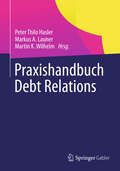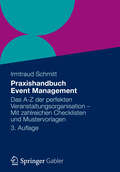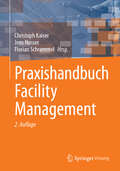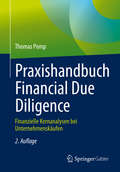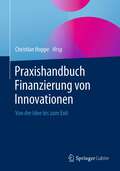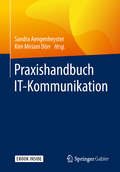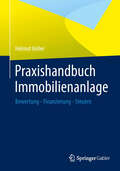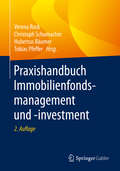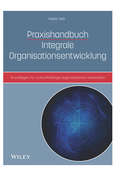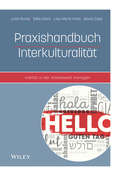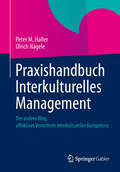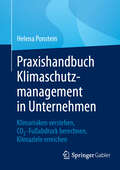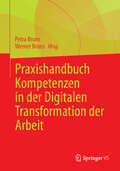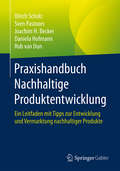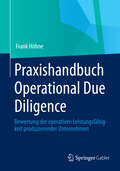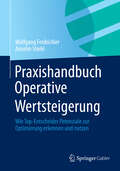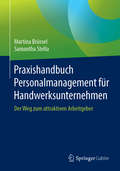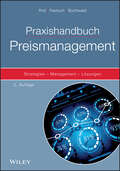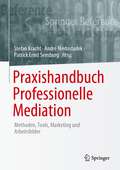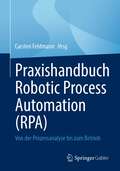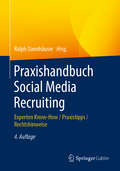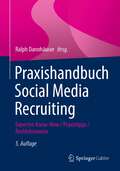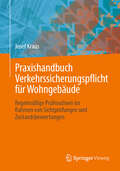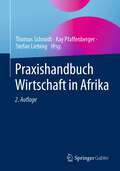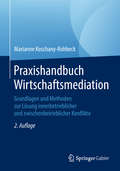- Table View
- List View
Praxishandbuch Debt Relations
by Peter Thilo Hasler Markus A. Launer Martin K. WilhelmDie Zeiten, in denen der traditionelle Bankkredit die nahezu einzige Möglichkeit zur Fremdkapitalaufnahme war, sind längst vorbei. Den Unternehmen steht heute eine Vielzahl unterschiedlicher Instrumente zur Verfügung, um speziell für die eigenen Pläne die optimale Finanzierungsstruktur zu bilden. In diesem Buch informieren Experten aus Praxis und Wissenschaft, wie Unternehmen Beziehungen zu Fremdkapitalgebern in idealer Weise aufbauen und pflegen. Sie geben einen ausführlichen Überblick über die marktgängigen Produkte und erkären, welche rechtlichen und organisatorischen Besonderheiten jeweils bei der Emission zu beachten sind.
Praxishandbuch Event Management: Das A-Z der perfekten Veranstaltungsorganisation - Mit zahlreichen Checklisten und Mustervorlagen
by Irmtraud SchmittDas Nachschlagewerk für alle, die in Unternehmen für Veranstaltungen verantwortlich sind! Es zeigt, wie man zeitsparend und budgetbewusst Veranstaltungen von A bis Z plant, organisiert und betreut - von der Außendiensttagung über den Messeauftritt, die Pressekonferenz, den Tag der offenen Tür, Workshops, Kongresse, Seminare, Weihnachtsfeiern... Schritt für Schritt - von der ersten Idee bis zur Nachbereitung gibt das Buch praxisorientierte Arbeitshilfen, jetzt mit noch mehr Checklisten, Mustervorlagen und nützlichen Internetlinks.
Praxishandbuch Facility Management
by Florian Schrammel Christoph Kaiser Jens NusserDieses in zweiter deutlich erweiterter Auflage erschienene Fachbuch ist ein Nachschlagewerk zu sämtlichen Themen der Bewirtschaftung, des Betriebs und der Verwaltung von Gebäuden, die dem Facility Manager bei seiner täglichen Arbeit begegnen. Der besondere Schwerpunkt liegt dabei auf rechtlichen und betriebswirtschaftlichen Fragestellungen sowie auf Nachhaltigkeitsthemen. Der Aufbau des Buches orientiert sich an einem klassischen Ablauf im Facility Management-Prozess. Der Leser findet zu Beginn eines jeden Kapitels eine fundierte und verständliche Einführung in die Thematik, kann aber bei speziellen Fragestellungen auch gezielt nachschlagen. Zahlreiche Beispiele und Praxistipps an den relevanten Stellen runden das Werk ab.
Praxishandbuch Financial Due Diligence: Finanzielle Kernanalysen bei Unternehmenskäufen
by Thomas PompDie Financial Due Diligence hat sich als fester Bestandteil von Mergers & Acquisitions-Prozessen etabliert. Der Kaufinteressent verfolgt mit der Financial Due Diligence das Ziel, die Informationsasymmetrie zwischen Kaufinteressent und Verkäufer zu vermindern. Dieses Buch stellt die Kernanalysen der Financial Due Diligence umfassend vor und veranschaulicht diese mit hohem Praxisbezug anhand von zahlreichen Fallbeispielen aus verschiedenen Industrien. Dabei wird auch der Einfluss der Ergebnisse der Financial Due Diligence auf die Ermittlung des Unternehmenswerts sowie auf die Kaufvertragsgestaltung behandelt. M&A-Einsteiger werden mithilfe dieses Leitfadens in die Lage versetzt, die Ergebnisse der Financial Due Diligence einzuordnen bzw. eigene Analysen durchzuführen. Praktiker mit M&A-Erfahrung können die Analysetechniken sowie die Auswirkungen der Ergebnisse der Financial Due Diligence auf die Unternehmensbewertung und Vertragsgestaltung weiter vertiefen.Die zweite Auflage wurde umfassend aktualisiert und berücksichtigt die Auswirkungen geänderter Rechnungslegungsstandards auf die Financial Due Diligence. Zudem wurde die zweite Auflage um den Themenkomplex Carve-Out erweitert. Das Buch erläutert die besonderen Anforderungen an die Financial Due Diligence im Rahmen von Carve-Out-Transaktionen.
Praxishandbuch Finanzierung von Innovationen: Von der Idee bis zum Exit
by Christian HoppeDieses Buch gibt sowohl Kapitalgebern als auch kapitalsuchenden, innovativen Unternehmen praxisorientierte Hilfestellung bei der Entwicklung individueller Finanzierungslösungen. Damit wird die Grundlage dafür gelegt, dass intelligente und mutige Gründer*innen ihre Ideen, die Fortschritt und Nutzen für weite Bevölkerungsteile bedeuten, bestmöglich realisieren. Dazu zählen beispielsweise Medikamente zur Krebsbekämpfung, innovative Mobilitätskonzepte oder Technologien im Bereich erneuerbare Energien.
Praxishandbuch IT-Kommunikation
by Sandra Aengenheyster Kim Miriam DörrDigitalisierung ist mittlerweile fester Bestandteil der Unternehmensstrategie, um im internationalen Wettbewerb mithalten zu können. Dementsprechend werden auch die IT-Abteilungen in Unternehmen in die Pflicht genommen. Das IT-Projektvolumen steigt stetig und damit auch der Druck, innovative Projekte erfolgreich auf- und umzusetzen.Das Buch zeigt anschaulich, welche Rolle Kommunikation für den Erfolg von IT-Projekten spielt, beschreibt die Grundlagen von interner und externer IT-Kommunikation und gibt konkrete, praxisrelevante Handlungsempfehlungen. Damit richtet es sich an IT-Führungskräfte, IT-Manager und IT-Kommunikationsspezialisten.
Praxishandbuch Immobilienanlage: Bewertung - Finanzierung - Steuern
by Helmut KellerImmobilienanlagen sind inflationssicher, wertbeständig und steuerlich privilegiert. Kauf, Finanzierung, Besitz und Verwaltung einer Immobilie müssen von Anfang an langfristig ausgerichtet sein und erfordern insbesondere in der aktuellen Niedrigzinsphase eine sorgfältige Planung, Umsetzung und Überwachung. Das nach wie vor günstige Umfeld, aber auch die beträchtlichen Preisunterschiede in den einzelnen Marktregionen und Ballungsgebieten machen eine sorgfältige und ausgewogene Investitionsvorbereitung unverzichtbar. Im Praxishandbuch erfahren Sie aus der Sicht eines neutralen Beraters alles, was Sie für eine erfolgreiche Immobilieninvestition wissen müssen. Der erste Teil stellt Ihnen die Essentials mit Checklisten und Tabellen versehen zum kompletten Überblick zur Verfügung. Im umfangreichen Glossar können Sie darüber hinaus alle wichtigen Details nachschlagen, die vor, während und nach Ihrer Investitionsentscheidung auftauchen können. Sie werden dabei unterstützt, auf Augenhöhe mit den jeweiligen Beratern oder Geschäftspartnern verhandeln und langfristig richtige und notwendige Entscheidungen treffen und umsetzen zu können.
Praxishandbuch Immobilienfondsmanagement und -investment
by Verena Rock Christoph Schumacher Hubertus Bäumer Tobias PfefferDieses Buch bietet einen praxisnahen Leitfaden zum Thema Immobilien-Fondsmanagement und -Investment. Mehr als 40 Branchenexperten geben Auskunft über das Instrumentarium des Investments und Managements von indirekten Immobilienanlagen. So werden die Akteure im Markt vorgestellt, deren Entscheidungsfindung ermittelt und das tägliche Geschäft im Fondsmanagement vorgestellt. Ein erfolgreiches Investment und Management von Immobilienfonds basiert auf guten Quellen, den geeigneten analytischen Methoden und einschlägigen Erfahrungen. Entsprechend beschreibt das Buch systematisch Beteiligungsmanagement aus Investorensicht, institutionelles Fondsmanagement, verschiedene Gruppen von Akteuren und die wichtigsten Vehikel in Europa. Den Abschluss bilden zahlreiche Musterbeispiele und Dokumentenvorlagen zu Strukturen, Verträgen und Kalkulationen als handhabbare Tools über Standards und Best-Practice-Modelle der Branche. Das Praxishandbuch bietet das Rüstzeug für Fondsmanager, Investoren und andere Akteure in diesem spannenden Sektor.
Praxishandbuch Integrale Organisationsentwicklung: Grundlagen für zukunftsfähige Organisationen entwickeln
by Heiko VeitIntegrale Organisationsentwicklung - bewusst, integral und wirkungsvoll! Der Ruf nach agileren, flexibleren Organisationen, die sinnstiftend tätig sind, wird immer lauter. Nachhaltigkeit, Corporate Social Responsibility und dergleichen mehr bedingen ein neues Verständnis von Organisation. Die alten Modelle sind überholt und es braucht eine neue Form von Orientierung. Hier braucht es dringend ein pragmatisches und trotzdem entwicklungsförderliches Modell, ein Modell, welches den Prozess in den Vordergrund stellt. Die Integrale Organisationsentwicklung stellt ein Modell für die Beschreibung, Gestaltung und Reflexion von Prozessen zur Verfügung. Wenn Sie mehr über Integrale Organisationsentwicklung erfahren und Ihre Kompetenz erweitern möchten, dann ist das Buch von Heiko Veit genau das Richtige für Sie! Das Praxishandbuch Integrale Organisationsentwicklung beschreibt eine Landkarte für die gesamte Komplexität von Entwicklungsprozessen in Organisationen. Es zeigt, wie man sich selbst sowie die Organisation in dieser Landkarte verortet und wie man Wege finden kann, wenn man in der Realität etwas verändern möchte. Das Buch betont die Rolle der eigenen Entwicklungsstufe, wenn man sich mit Organisationsentwicklung beschäftigt. Darüber hinaus enthält es viele Denkmodelle auf dem Weg zu einer integralen Organisation. Es zeigt, wie man eine gesunde Basis schaffen kann, um eine sinnvolle Weiterentwicklung von evolutionären Prinzipien hin zu mehr Komplexität, Sinn, Ordnung, Erkenntnis und Vertrauen im Business-Kontext zu erreichen.
Praxishandbuch Interkulturalität: Vielfalt in der Arbeitswelt managen
by Jutta Rump Silke Eilers Lisa-Marie Kreis David ZappDie kulturelle Vielfalt in der Arbeitswelt wird in den kommenden Jahren und Jahrzehnten eine der zentralen Herausforderungen darstellen - nicht zuletzt durch die Flüchtlingsströme der letzten Monate und Jahre, deren Integration in die Gesellschaft und den Arbeitsmarkt eine immense Wichtigkeit hat und fast täglich Gegenstand der politischen Diskussion ist. Untrennbar damit verbunden ist der Blick darauf, inwieweit bislang die Integration von Menschen gelingt, die zwar in Deutschland geboren sind, jedoch einen Migrationshintergrund aufweisen. Darüber hinaus gehört zur Betrachtung der Interkulturalität als eine der entscheidenden Diversitätsdimensionen auch die Beschäftigung damit, wie sich Fach- und Führungskräfte für den deutschen Arbeitsmarkt gewinnen und an ihn binden lassen, und wie es gelingen kann, in multinationalen Belegschaften die richtige Balance zwischen Individualität und gemeinsamen kulturellen Werten zu schaffen. Diese Aufgaben werden Unternehmen und das Personalmanagement auf absehbare Zeit stark fordern. Und genau dort setzt das "Praxishandbuch Interkulturalität" an. Nach einer kurzen allgemeinen Einführung gliedert sich das Buch in vier Unterkapitel. Das erste inhaltliche Kapitel beschäftigt sich mit der Integration von Geflüchteten in den deutschen Ausbildungs- und Arbeitsmarkt. Im zweiten Kapitel steht die Integration von in Deutschland geborenen Menschen mit Migrationshintergrund im Fokus. Kapitel drei widmet sich der Internationalen Rekrutierung und berücksichtigt dabei unterschiedliche Zielgruppen (High Potential, Fachkräfte mittleren Qualifikationsniveaus sowie niedrig qualifizierte Kräfte). Das letzte inhaltliche Kapitel schließlich betrachtet multinationale Belegschaften aus unterschiedlichen Blickwinkeln. Das Buch schlägt darüber hinaus eine Brücke zwischen Wissenschaft und Praxis, indem aktuelle Studienergebnisse und statistische Hintergrundinformationen mit sehr praktischen Handlungsempfehlungen und Praxisbeispielen aus Unternehmen unterschiedlicher Branchen und Größen verknüpft werden.
Praxishandbuch Interkulturelles Management: Affektives Vermitteln interkultureller Kompetenz
by Ulrich Nägele Peter M. HallerDieses umfassende Praxishandbuch befähigt den Leser, zukünftig interkulturelle Trainings inhaltlich und ablauforganisatorisch kulturadäquat zu konzipieren, durchzuführen und nachzubereiten. Und es vermittelt interkulturelle Kompetenz, im Besonderen fördert es ein vertieftes Verständnis für die Vielfalt von Kulturen und die Bereitschaft, sich selbst in einem lebenslangen Lern- und Persönlichkeitsentwicklungsprozess zu sehen. Die erfahrenen Autoren vermitteln die Inhalte fundiert, anschaulich und praxisorientiert. Peter M. Haller war 30 Jahre internationale Führungskraft für multinationale Unternehmen in der Schweiz, Deutschland, Frankreich, Belgien und Japan. Seit 1994 arbeitet er als Trainer und Coach für interkulturelle Kommunikation, Zusammenarbeit und Unternehmensführung in der Wirtschaft sowie für GOs und NGOs. Er war Dozent an Fachhochschulen in Deutschland und der Schweiz, mit Lehraufträgen an universitären Weiterbildungszentren in China, Vietnam, Russland, Ukraine, Ungarn, Weißrussland, Litauen, Slowakei, Tunesien und Namibia. Ulrich Nägele ist international zertifizierter Projektmanagementexperte (PMP®) und seit 1993 für führende Weiterbildner sowie globale wie nationale Unternehmen aktiv. Er trainiert und berät in der Professionalisierung von Projektmanagement und unterstützt Projektteams und die Organisations- und Personalentwicklung mit eigenen Transfermethoden u. a. mit Fokus auf kulturübergreifender Zusammenarbeit. In den 90er Jahren hat er internationale Projekte in Ost- und Zentraleuropa geleitet. Studium der Pädagogik, Volkswirtschaftslehre und Politik mit Abschluss Magister Atrium der Universität Stuttgart.
Praxishandbuch Klimaschutzmanagement in Unternehmen: Klimarisiken verstehen, CO2-Fußabdruck berechnen, Klimaziele erreichen
by Helena PonsteinDieses Buch richtet sich an Entscheidungsträger und -trägerinnen in Unternehmen, die mit Klimarisiken, Klimazielen und Berichtspflichten umgehen müssen. Es beschreibt anschaulich und praxisnah, wie betriebliches Klimaschutzmanagement umgesetzt wird. Klimaschutzmanagement dient als Navigationssystem, um den Einfluss von Klimawandelfolgen auf Ihr Unternehmen zu antizipieren sowie die Auswirkungen Ihres Unternehmens auf den Klimawandel zu ermitteln und zu reduzieren. Es zeigt einen Weg auf, wie mit der Herausforderung der Klimaneutralität umgegangen werden kann. In neun einfachen Schritten leitet dieses Handbuch auf Basis erprobter Prozesse zur korrekten Berechnung der Treibhausgasemissionen bzw. des CO2-Fußabdrucks an. Hierzu stellt es Kenntnisse der wichtigsten Emissionsfaktoren, Checklisten und Praxistipps bereit. Es klärt grundlegende Begriffe und vermittelt Basiswissen zum Festlegen wissenschaftsbasierter Klimaziele. Darauf aufbauend folgt eine Anleitung für eine praxistaugliche Klimaschutzstrategie. Damit bietet dieses Handbuch eine Blaupause für das Meistern der neuen Compliance-Regeln der Europäischen Union zu betrieblichem Klimaschutz.
Praxishandbuch Kompetenzen in der Digitalen Transformation der Arbeit
by Petra Bruns Werner BrunsDas Praxishandbuch arbeitet die Kompetenzen für zukünftiges Arbeiten im Kontext der Digitalen Transformation heraus und soll Staat, Unternehmen und Zivilgesellschaft als Entscheidungshilfe in den Bereichen Strategie-, Personal- und Innovationmanagement dienen.Mensch und Technik waren sich durch die Digitalisierung noch nie so nah wie heute. Diese Nähe verändert Mensch, Unternehmen, Arbeit und Leben. Solche Veränderungen muss man verstehen, um mitzuhalten. Denn nur das, was wir verstehen, können wir auch aktiv und kreativ im Arbeitsalltag umsetzen und gestalten. Staat, Unternehmen und auch die Zivilgesellschaft müssen sich zukünftig noch stärker in ihren Entscheidungen darauf einstellen.Wichtige Kompetenzfelder sind heute die sozialen Prozesse im Zuge der beschleunigten Digitalen Transformation von Wirtschaft, Gesellschaft und Politik. Analysieren, Einordnen, Denken, Handeln und Evaluieren. Technologie, Talente, Toleranz und Tradition zusammen denken. Änderungen im Unternehmen vorschlagen, die sinnvoll sind und das mit Leidenschaft tun.
Praxishandbuch Nachhaltige Produktentwicklung: Ein Leitfaden mit Tipps zur Entwicklung und Vermarktung nachhaltiger Produkte
by Daniela Hofmann Sven Pastoors Joachim H. Becker Ulrich Scholz Rob Van DunNachhaltige Lebensmittel, nachhaltige Textilien, nachhaltiger Konsum – immer mehr Unternehmen orientieren sich am Trend und den Grundsätzen der nachhaltigen Entwicklung. Damit bedienen sie nicht nur einen wachsenden Markt, sondern schonen gleichzeitig natürliche Ressourcen und senken so ihre Produktionskosten. Das Praxishandbuch zeigt Unternehmen, wie sie ihre Produktion und ihr Marketing langfristig auf nachhaltige Methoden und Techniken umstellen können. Dabei folgen die Autoren dem Green Marketing. Dieser Ansatz geht auf das steigende Umweltbewusstsein der Kunden ein und hilft so Unternehmen, die eigene Marktposition mithilfe nachhaltiger Produkte zu stärken. Die Autoren richten sich damit an mittelständische Unternehmen sowie Entscheider und Führungskräfte in größeren Unternehmen, die wissen möchten, wie sie mit umweltbewusster Produktentwicklung neue Märkte erschließen und ihre Wettbewerbsfähigkeit steigern können.Die insgesamt 21 Kapitel sind in vier große Themenblöcke zusammengefasst: „Grundlagen der Nachhaltigkeit“, „Grundlagen der Produktentwicklung“, „Phasen der nachhaltigen Produktentwicklung“ und „Ausblick“. Dabei geht es sowohl um grundsätzliche, als auch praktische Fragen: Welche Faktoren begünstigen die Entwicklung nachhaltiger Produkte? Was sind die betrieblichen und rechtlichen Rahmenbedingungen? Was sind die Phasen der nachhaltigen Produktentwicklung? Und wie können Unternehmen umweltfreundliche Produkte am besten vermarkten? Die Kapitel bauen inhaltlich aufeinander auf, sind aber in sich abgeschlossen und auch unabhängig voneinander gut verständlich. Daher lässt sich das Buch gut als Leitfaden oder Nachschlagewerk benutzen. Darüber hinaus eignet sich der Band als Lehrbuch an Berufs- und Fachhochschulen.
Praxishandbuch Operational Due Diligence
by Frank HöhneIm Rahmen von Unternehmensakquisitionen im industriellen Sektor steht die Begutachtung der operativen Leistungsfähigkeit des Unternehmens im Fokus der Due Diligence. Diese hat zum Ziel, dem potenziellen Käufer Chancen und Risiken entlang der Wertschöpfungskette aufzuzeigen, damit diese im Mergers & Acquisitions-Prozess angemessen berücksichtigt werden können. Das vorliegende Buch zeigt die wesentlichen Analysebereiche der Operational Due Diligence auf und stellt deren Methoden und Tools vor. Hierbei richtet es sich sowohl an den Einsteiger als auch an den erfahrenen ODD-Projektmanager.
Praxishandbuch Operative Wertsteigerung: Wie Top-Entscheider Potenziale zur Optimierung erkennen und nutzen
by Wolfgang Freibichler Anselm StiehlWie können Investoren und Manager durch operative Verbesserungen den Wert eines Unternehmens nachhaltig steigern? Basierend auf ihrer mehrjährigen Beratungserfahrung liefern die Autoren fundierte und praxistaugliche Hinweise, wie die wesentlichen Werttreiber identifiziert und positiv beeinflusst werden können. Die klare Struktur des Handbuchs ermöglicht die gezielte Suche nach geeigneten Management-Instrumenten. Zusammenfassungen, Abbildungen und Checklisten helfen, die wesentlichen Konzepte auch in kurzer Zeit zu verinnerlichen und umzusetzen.
Praxishandbuch Personalmanagement für Handwerksunternehmen: Der Weg zum attraktiven Arbeitgeber
by Martina Brüssel Samantha StellaNutzen Sie dieses Praxishandbuch für Ihr Personalmanagement im HandwerkDer Fachkräftemangel ist ein großes Problem in Deutschland und macht auch vor Handwerksunternehmen keinen Halt. Dieser Faktor erschwert Unternehmern das gesamte Personalmanagement. Die richtigen Mitarbeiter zu finden, sie richtig einzuplanen, zu motivieren und schließlich auch zu halten, stellt viele Personalverantwortliche vor große Herausforderungen. Das Werk unterstützt Geschäftsführer, Führungskräfte und Personalverantwortliche bei allen Fragen der Personalplanung und gibt hilfreiche Antworten auf folgende Fragen: Was macht einen attraktiven Arbeitgeber aus?Wie sucht und findet man passende Mitarbeiter?Wie können Handwerksbetriebe Mitarbeiter motivieren, fördern und entwickeln?Wie plant und führt man ein Vorstellungsgespräch?Welche Aspekte gibt es bei der Trennung von Mitarbeitern zu beachten?Wie sieht die Zukunftsgestaltung einer guten Personalstrategie aus?Arbeitsmaterialien erleichtern die Anwendung in der PraxisEine große Stärke dieses Praxishandbuchs über das Personalmanagement im Handwerk ist seine Kombination von theoretischem Wissen mit Tipps zur praktischen Umsetzung. Zahlreiche Checklisten, Fragenkataloge, Grafiken und Praxisbeispiele helfen bei der Umsetzung von: PersonalbedarfsplanungIdeen für eine erfolgreiche PersonalsucheErstellung von StellenbeschreibungenOn- und Off-Boarding ProzesseEinarbeitung neuer MitarbeiterProfessionelle MitarbeiterführungEntwicklung einer eigenen Personalstrategie durch die UnternehmensführungDamit bietet das Praxishandbuch über Personalmanagement im Handwerk einen leichten Einstieg in alle Fragen des Personalwesens und ist ein idealer Begleiter im Alltag aller Führungsverantwortlichen in mittelständischen Unternehmen.
Praxishandbuch Preismanagement: Strategien - Management - Lösungen
by Prof. Oliver Roll Kai Pastuch Gregor BuchwaldDie Hebelwirkung einer Preisoptimierung ist enorm. Schon kleine Veränderungen des Preises schlagen sich meist signifikant auf den Gewinn nieder. Mit den richtigen Methoden und Konzepten im Preismanagement können Unternehmen ihre Ertragssituation nachhaltig verbessern. Die Autoren stellen einen umfassenden und praxisorientierten Ansatz vor, der es Firmen erlaubt, schnell Verbesserungspotenziale im eigenen Unternehmen aufzudecken. In einem vierschrittigen Konzept aus Preisstrategie, Produktpricing, Kundenpricing und Preisdurchsetzung im Markt werden alle Ansatzpunkte im Preismanagement ausführlich und detailliert behandelt. Ein wichtiger Aspekt im Buch sind Praxisbeispiele und Cases. An vielen Stellen werden die Ausführungen durch Best-Practices aus dem Unternehmensalltag ergänzt. Dies gibt einen guten Einblick, wie sich die einzelnen Themen in der Praxis tatsächlich lösen lassen. Zusätzlich finden sich auch ausführliche und sehr informative Fallstudien von GE und MAN. Das Autorenteam verfügt über eine langjährige Erfahrung in allen Bereichen des Preismanagements und hat für zahlreiche, internationale Unternehmen Pricingprojekte geleitet. Dies zeigt sich im Buch auf jeder Seite. Alle Tipps und Tricks entstammen dem Unternehmensalltag und sind direkt praxiserprobt. Der Leser erhält dadurch Managementwissen aus erster Hand, um ein erfolgreiches Preismanagement im eigenen Unternehmen zu implementieren. Durch das systematische Vorgehen und die umfassenden Praxisbeispiele können sowohl Pricing-Einsteiger als auch Pricing-Profis viele wertvolle Hinweise für die tägliche Arbeit gewinnen. Stimmen zum Buch: Das Buch gehört definitiv zur Pflichtlektüre für jeden, der sich mit dem Thema beschäftigt. Dr. Volker Letzgus, Konzerncontrolling BMW Group Profundes Wissen zum Preismanagement und eine Vielzahl wertvoller Praxisbeispiele bieten exzellente Impulse für erfolgreiche Ertragssteigerung. Volker Claas, CLAAS Gruppe Preismanagement ist hier intelligent und kenntnisreich dargestellt, der pragmatische Ansatz macht das Werk zu einer gewinnbringenden Lektüre sowohl für Pricing-Einsteiger als auch für erfahrene Manager. Pol Vanaerde, Präsident European Pricing Platform Die Kombination aus fundiertem Wissen und vielen Praxisbeispielen macht dieses Buch zu einer ausgesprochen gewinnbringenden Lektüre. Michael Burkert, Professor HEC Lausanne
Praxishandbuch Professionelle Mediation: Methoden, Tools, Marketing und Arbeitsfelder
by André Niedostadek Stefan Kracht Patrick Ernst SensburgDas Praxishandbuch Professionelle Mediation ist nicht nur eine umfassende Hilfestellung für die Mediationspraxis, sondern zugleich auch ein strukturiertes Handbuch zum vertieften Einarbeiten in eine Vielzahl einzelner Aspekte. Umfasst sind alle wichtigen Bereiche der Mediation. Diese werden in rund 70 Beiträgen durch ein interdisziplinäres und hochkarätig besetztes Team von Autorinnen und Autoren abgedeckt. Dabei steht die Mediationspraxis ganz im Fokus: Erfahrungen, Tipps und Beispiele sichern die Umsetzung in die eigene Praxis. Das Buch behandelt Methoden, Prinzipien, Techniken und Arbeitsgebiete,hilft bei der Durchführung einer Mediation,unterstützt bei der Positionierung und Akquise,vermittelt das nötige Basiswissen (auch zu neueren Anwendungsformen der Mediation, wie z.B. die Online Mediation oder Cross-Over Mediation),enthält zusätzlich Checklisten und sonstige hilfreiche Hinweise.Zudem erhalten Praktiker ausführliche Informationen zu wichtigen Fragen wie der Honorierung oder ethisch richtigem Verhalten. Informationen zu den Ausbildungsanforderungen in den unterschiedlichen Bereichen runden das Buch ab, ebenso wie die Darstellung der unterschiedlichen rechtlichen Rahmenbedingung in den verschiedenen Grundberufen. Zielgruppen: Mediatoren, die bereits in der Praxis tätig sind bzw. Anwälte, Sozialpädagogen, Psychologen, Therapeuten, Ärzte, Sozialarbeiter, Richter, Juristen in Wirtschaft und Verwaltung oder andere Mediationsinteressierte, die sich Mediation als Arbeitsfeld erschließen wollen.
Praxishandbuch Robotic Process Automation (RPA): Von der Prozessanalyse bis zum Betrieb
by Carsten FeldmannDas Buch bietet einen praxisorientierten Überblick zu Implementierung und Betrieb von RPA-Lösungen. Es beleuchtet Prozessautomatisierung aus verschiedenen Perspektiven, um die vielschichtige Thematik umfassend zu verstehen: Von der Software-Einführung durch ein IT-Beratungsunternehmen über den Industriekonzern als Betreiber bis zum Anwalt für IT-Rechtsfragen. Neben Vorgehensmodellen zur Einführung von RPA werden Erfolgsfaktoren für den Betrieb und zahlreiche Praxisbeispiele vorgestellt. Grundlagen und relevante Erfahrungswerte für die Praxis werden fundiert vermittelt.
Praxishandbuch Social Media Recruiting: Experten Know-How / Praxistipps / Rechtshinweise
by Ralph DannhäuserErfahrene Experten zeigen, wie man die wichtigsten Social-Media-Kanäle für die Personalgewinnung erfolgreich nutzen kann. Die Autoren offenbaren ihre Erfolgsgeheimnisse und zeigen auf, wie Sie mit Social Recruiting mehr und besser qualifizierte Bewerber finden. Sie erfahren auch, welche Möglichkeiten es mit „Employer Branding“ für Ihr Unternehmen gibt, um im „War for Talents“ Ihrem Mitbewerber einen Schritt voraus zu sein. Rechtshinweise, Praxisbeispiele, Interviews und Leitfäden sowie eine systematische Gliederung bieten Ihnen eine praktische Entscheidungshilfe für die tägliche Arbeit.Neu in der 4. Auflageu.a. „Instagram“, „Recruiting-Videos“, „Corporate Influencer“, „Social Recruiting in der Schweiz und in Österreich“, „HR-Analytics“, „Desinformationsangriffe gegen die Arbeitgebermarke“ sowie aktualisierte Themenkapitel und Praxisinterviews.
Praxishandbuch Social Media Recruiting: Experten Know-How / Praxistipps / Rechtshinweise
by Ralph DannhäuserIm zehnten Jahr nach der Erstauflage zeigen erfahrene Experten aus der Praxis in diesem überarbeiteten Praxishandbuch, wie Sie die wichtigsten Social-Media-Kanäle für Ihre Personalgewinnung erfolgreich und effektiv nutzen. Die Autoren offenbaren ihre Erfolgsgeheimnisse und zeigen, wie Sie mit aktiver Personalsuche die Quantität und Qualität der Bewerber signifikant steigern können, um im „War for Talent“ Ihren Mitbewerbern einen Schritt voraus zu sein. Zahlreiche Praxisbeispiele, Interviews, Checklisten und Rechtshinweise sowie eine klare und systematische Gliederung bieten praktische Entscheidungshilfen für Ihre tägliche Arbeit.Neu in der 5. AuflageSocial Media Recruiting mit TikTok, Social Media Recruiting für gewerbliche und soziale Berufe, Erfolgsfaktoren bei der Stellenbesetzung, mit Storytelling zum wirkungsvollen Employer Branding, Social Media Recruiting Kampagnen und ihre Wechselwirkung mit der Candidate Experience, neue Strukturen und Prozesse in Social Media Recruiting.
Praxishandbuch Verkehrssicherungspflicht für Wohngebäude: Regelmäßige Prüfroutinen im Rahmen von Sichtprüfungen und Zustandsbewertungen
by Josef KrausDieses Praxisbuch bietet eine verständliche Anleitung zur Durchführung einer Verkehrssicherheitsprüfung v0on Wohngebäuden und dazugehöriger Peripherie. Die relevanten Bezüge zu Normen und Richtlinien sowie Rechtsgrundlagen werden berücksichtigt und runden das Werk ab.
Praxishandbuch Wirtschaft in Afrika
by Thomas Schmidt Kay Pfaffenberger Stefan LiebingAfrika ist ein Kontinent im Aufschwung, der eine große wirtschaftliche Dynamik entwickelt. Wenn deutsche Unternehmen am Aufschwung Afrikas partizipieren wollen, müssen sie mit einigen Besonderheiten vertraut sein. Das Buch zeigt diesen Weg zu erfolgreichen Geschäften in Afrika. Es ist ein praxisorientierter, gleichwohl wissenschaftlich fundierter Ratgeber für alle Unternehmer und wirtschaftlich Interessierten, die in Afrika erfolgreich sein wollen. Es vereint dabei die Erfahrungen vieler Unternehmen mit der wissenschaftlichen Perspektive und den Erkenntnissen des Centre for Business und Technology in Africa der Hochschule Flensburg. In der 2. Auflage werden neue Entwicklungen auf dem afrikanischen Kontinent aufgegriffen und aktuelle Antworten gegeben auf die klassischen Fragen, die jeder Akteur für sich beantworten muss, der in Afrika wirtschaftlich erfolgreich sein will: WARUM Afrika für das Geschäft interessant ist, WO die größten Erfolgsaussichten bestehen, WIE vorzugehen ist und WELCHE Ansätze zur künftigen Gestaltung der Wirtschaftsbeziehungen zwischen Deutschland und Afrika erfolgsvorsprechend sind. Das Buch beschreibt, wie in Afrika investiert werden kann und bündelt die aktuellen Erfahrungen von Managern großer Konzerne und Familienunternehmen mit langjähriger Geschichte auf dem Kontinent.
Praxishandbuch Wirtschaftsmediation: Grundlagen und Methoden zur Lösung innerbetrieblicher und zwischenbetrieblicher Konflikte
by Marianne Koschany-RohbeckDas praxisorientierte Handbuch beschreibt umfassend das Verfahren der Wirtschaftsmediation als nachhaltige und ökonomisch sinnvolle Konfliktmanagementstrategie zur Lösung innerbetrieblicher sowie zwischenbetrieblicher Auseinandersetzungen. Neben den Grundlagen werden Konfliktkompetenzen, neue Erkenntnisse aus dem Verhandlungsmanagement sowie die Kommunikations- und Moderationstechniken, die in der Wirtschaftsmediation zum Einsatz kommen, dargestellt. Darüber hinaus werden die rechtlichen Aspekte der Mediation sowie die Anforderungen an einen Mediator beschrieben. Die einzelnen Phasen des Mediationsverfahrens werden ausführlich erklärt und durch Praxisbeispiele veranschaulicht. Abschließend werden die sehr hohen Konfliktkosten thematisiert, die ein Hauptargument dafür liefern, Wirtschaftsmediation im Unternehmen zu etablieren. Checklisten, Fragebögen und Vertragsmuster machen das Buch zu einem idealen Begleiter für Mediationsprozesse im Unternehmen. Es berücksichtigt die Ausbildungsbestimmungen der Verordnung über die Aus- und Fortbildung von zertifizierten Mediatoren (ZMediatAusbV), die 2016 von der Entwurfs- in die nun gültige Verordnung übernommen wurden, und ist damit für den Einsatz in der Lehre hervorragend geeignet.
